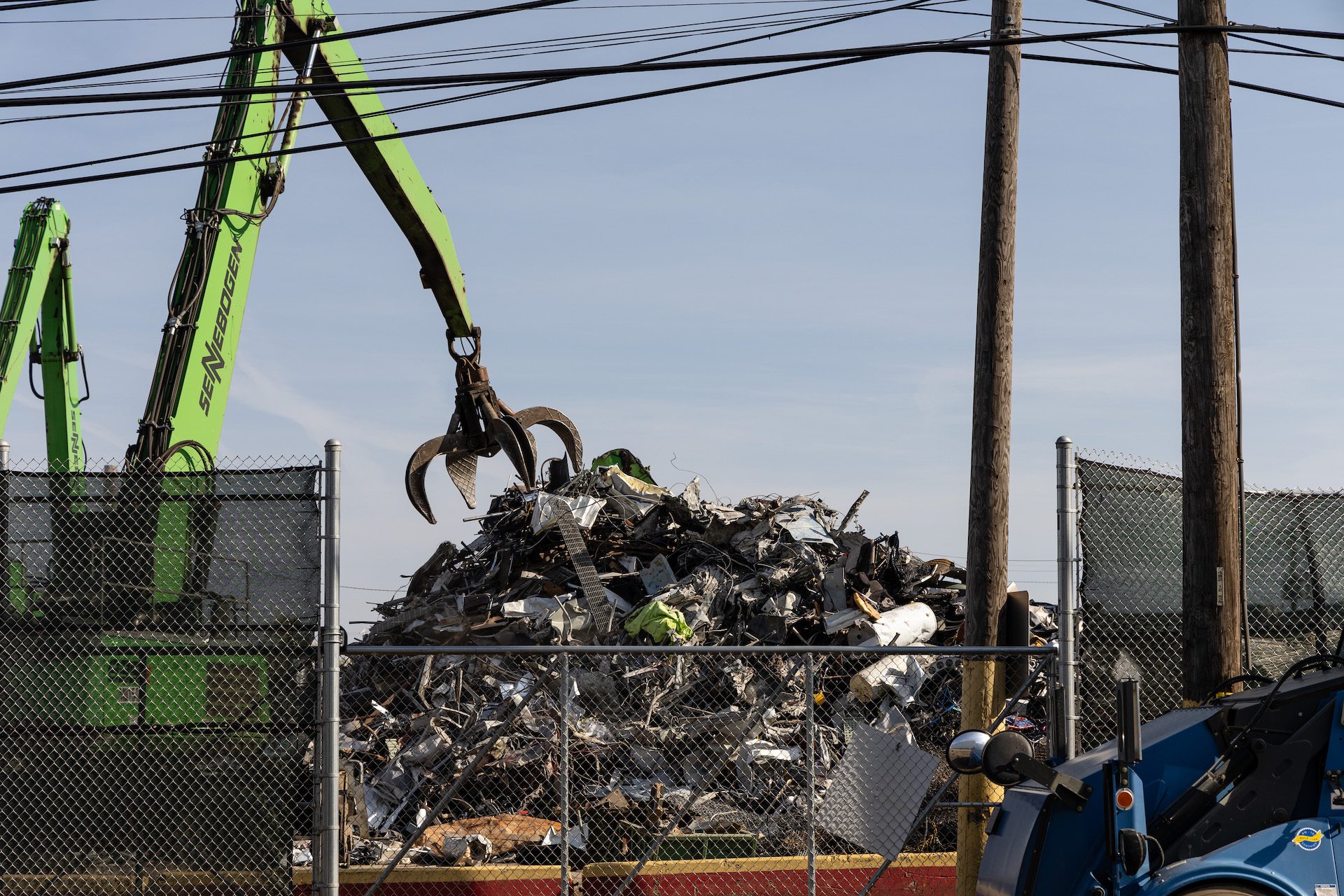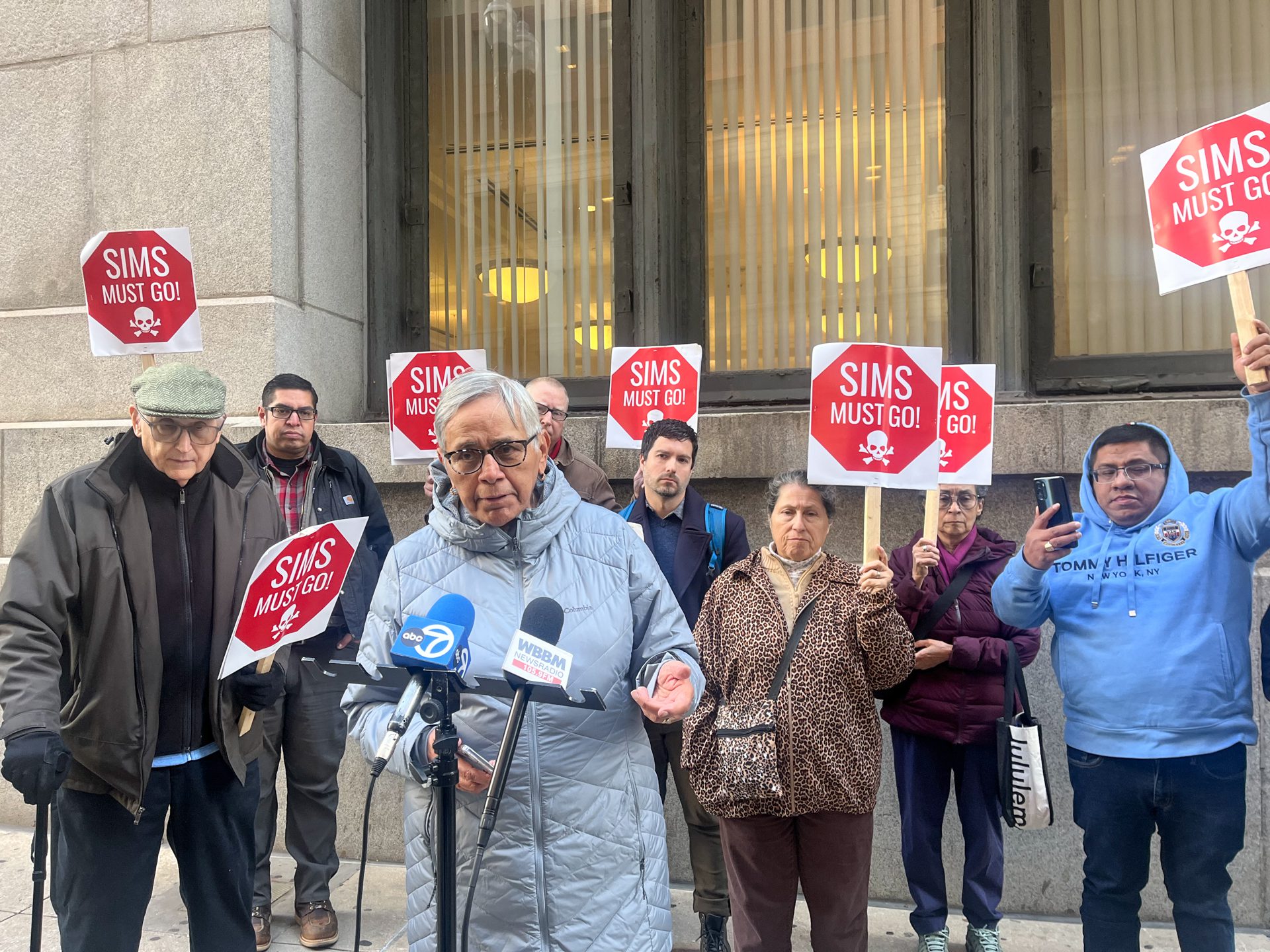 Oscar Gomez/Borderless Magazine
Oscar Gomez/Borderless MagazineSims Metal Management and the EPA say that the recycler is not producing dangerous pollution. But residents say their health is on the line.
Protestors gathered outside Chicago City Hall on Monday to demand that the city not approve a permit for the Sims Metal Management facility in the Pilsen neighborhood, which recycles scrap metal.
Members of the Southwest Environmental Alliance said they want the Chicago Department of Public Health to conduct a comprehensive risk assessment before granting the permit to Sims and for the city to consider the community’s existing environmental and health issues. They called on the mayor to fulfill his promises to fight environmental racism and protect what the city calls “environmental justice communities,” those that see greater burdens of pollution from industry and traffic.
“We want the mayor to step up,” said Theresa McNamara, chair of the Southwest Environmental Alliance, a coalition of groups from the Southwest Side including the predominantly Latino neighborhoods of Pilsen, Little Village and Back of the Yards. “He’s been neglecting us.”
Want to receive stories like this in your inbox every week?
Sign up for our free newsletter.

The city issued a draft permit on Oct. 8 to continue the scrap metal shredding operations at 2500 S. Paulina Street, stating that the application complies with city rules for large recycling facilities. The city is accepting public comments on the draft permit until Nov. 7.
CDPH spokesperson Grace Adams said the department would make “any necessary adjustments” to the draft permit following the public comment period.
The scrap metal recycler was sued by the State of Illinois in 2021 for violating federal air pollution rules. The Environmental Protection Agency ordered Sims to install air monitors and has been collecting data on potentially hazardous pollutants from the monitors since September 2022. Monitors collect information on volatile organic compounds, multiple metals, and PM10, which can cause heart or lung disease and are made up of various materials, including smoke, soot and metals.
“EPA required air monitoring at Sims because we want the community to have clean air,” said an agency spokesperson. “EPA understands that the community has environmental justice concerns and we want to be responsive.”
According to the EPA, air pollution monitor data they have collected so far shows that emissions from the scrap metal recycler would not cause short- or long-term health effects for the community near the facility, but nearby residents want to see more air pollution controls in place before another permit is granted.
“Sims Metal has spent several years working with the City of Chicago and the State of Illinois to improve the environmental performance of its site in Pilsen; in fact, the air at our facility has just recently been given a clean bill of health from the United States EPA,” a Sims spokesperson said in a statement to Borderless Magazine.
Sims also said the company will complete the installation of updated environmental control equipment in the facility by December to improve air quality and minimize future emissions. The EPA plans to test the equipment by Jan. 2025.
“This renewal will not change our focus on earnest partnerships with our neighbors and our cooperation with all federal, state, and local agencies to meet or exceed operational expectations,” said the Sims spokesperson. “The health and safety of the community, particularly nearby residents, as well as our employees, remains our number one priority.”
Brian McKeon, one of the activists at the protest, said Sims and the state should also be measuring PM2.5 in the air, which is derived from cars and trucks, factories, wood burning, and smoke. Environmental advocates from the Southwest Side have previously expressed concern for their health and the environment in their community due to PM2.5 coming from trucks that drive in and out of large industrial facilities like Sims.
Three schools are located within a mile radius of the scrap metal facility, a factor that the EPA and the city should consider in assessing the environmental and health impacts of the facility’s pollution, said McKeon.
Community members at the protest also said the city should consider Sim’s history of environmental violations and the risks it poses to the already overburdened community of Pilsen when deciding whether to grant a permit and conduct a comprehensive risk assessment.
Adams from CDPH said that a Health Impact Assessment is a tool the department uses to evaluate health impacts on the surrounding community for new or expanding facilities; however, Sims is not proposing new or expanded operations in its permit application that could increase environmental or health risk impacts.
The mayor’s office did not respond to a request for comment.
Community members’ push for better health protections is part of a larger effort by environmental advocacy groups to get the city to consider communities’ existing environmental conditions when making permit decisions.

In 2022, HUD found that the city’s permitting and zoning policies were environmentally discriminatory, disproportionately burdening communities of color on the South and West sides. The agency required the city to reform its planning and zoning policies to address the issue.
The city has started the work, finalizing a cumulative impacts study last year, but it has yet to introduce a cumulative impacts ordinance, which would require regulators to consider the collective environmental and health impacts that a facility’s operation would have on the surrounding community.
The assessment identified Pilsen as one of the communities most burdened by pollution and vulnerable to its effects based on environmental exposures, existing health issues, and socioeconomic factors.
“I have a lung disease, and my mother died of a lung disease,” said Mary Gonzales, one of the activists at City Hall and a long-time Pilsen resident. “And the reason I have a lung disease is because I live in the neighborhood I love to live in.”

Bring power to immigrant voices!
Our work is made possible thanks to donations from people like you. Support high-quality reporting by making a tax-deductible donation today.
